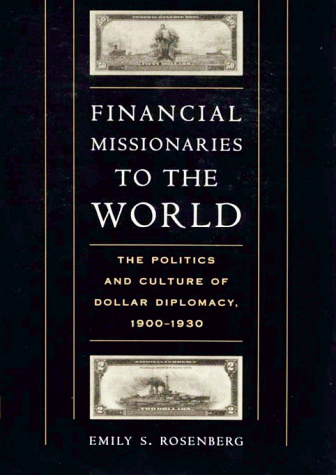American Encounters/Global Interactions
2 total works
Recently, a volatile global economy has challenged the United States to rethink its financial policies toward economically troubled countries. The author suggests that perplexing questions about how to standardize practices within the global financial system, and thereby strengthen market economies in unstable areas of the world, go back to the early decades of this century. Then, dollar diplomacy - the practice of extending private US bank loans in exchange for financial supervision over other nations - provided America's major approach to stabilizing economies overseas and expanding its influence. Policymakers, private bankers, and the members of the merging profession of international economic advising cooperated in devising arrangements by which US banks would extend foreign loans on the condition that the countries hire US experts to revamp financial systems and exercise some supervision. Rosenberg demonstrates that these arrangements were not simply technical and shows how they became central to foreign policy debates during the 1920s, when increasingly vocal critics at home and aborad assailed dollar diplomacy as a new imperialism. she explores how loan-for-supervision arrangements interrelated with broad cultural notions of racial destiny, professional expertise, and the virtues of manliness.
an innovative, interdisciplinary study, this work illuminates the dilemmas of public/private cooperation in foreign economy policy and the incalculable consequences of exercising financial power in the global marketplace.
an innovative, interdisciplinary study, this work illuminates the dilemmas of public/private cooperation in foreign economy policy and the incalculable consequences of exercising financial power in the global marketplace.
December 7, 1941-the date of Japan's surprise attack on the U.S. fleet at Pearl Harbor-is "a date which will live" in American history and memory, but the stories that will live and the meanings attributed to them are hardly settled. In movies, books, and magazines, at memorial sites and public ceremonies, and on television and the internet, Pearl Harbor lives in a thousand guises and symbolizes dozens of different historical lessons. In A Date Which Will Live, historian Emily S. Rosenberg examines the contested meanings of Pearl Harbor in American culture.
Rosenberg considers the emergence of Pearl Harbor's symbolic role within multiple contexts: as a day of infamy that highlighted the need for future U.S. military preparedness, as an attack that opened a "back door" to U.S. involvement in World War II, as an event of national commemoration, and as a central metaphor in American-Japanese relations. She explores the cultural background that contributed to Pearl Harbor's resurgence in American memory after the fiftieth anniversary of the attack in 1991. In doing so, she discusses the recent "memory boom" in American culture; the movement to exonerate the military commanders at Pearl Harbor, Admiral Husband Kimmel and General Walter Short; the political mobilization of various groups during the culture and history "wars" of the 1990s, and the spectacle surrounding the movie Pearl Harbor. Rosenberg concludes with a look at the uses of Pearl Harbor as a historical frame for understanding the events of September 11, 2001.
Rosenberg considers the emergence of Pearl Harbor's symbolic role within multiple contexts: as a day of infamy that highlighted the need for future U.S. military preparedness, as an attack that opened a "back door" to U.S. involvement in World War II, as an event of national commemoration, and as a central metaphor in American-Japanese relations. She explores the cultural background that contributed to Pearl Harbor's resurgence in American memory after the fiftieth anniversary of the attack in 1991. In doing so, she discusses the recent "memory boom" in American culture; the movement to exonerate the military commanders at Pearl Harbor, Admiral Husband Kimmel and General Walter Short; the political mobilization of various groups during the culture and history "wars" of the 1990s, and the spectacle surrounding the movie Pearl Harbor. Rosenberg concludes with a look at the uses of Pearl Harbor as a historical frame for understanding the events of September 11, 2001.

